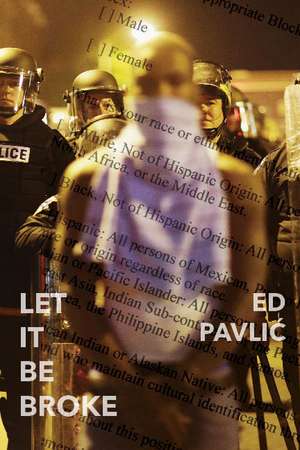Let It Be Broke
Autor Ed Pavlicen Limba Engleză Paperback – mar 2020
Preț: 90.72 lei
Nou
Puncte Express: 136
Preț estimativ în valută:
17.36€ • 18.02$ • 14.48£
17.36€ • 18.02$ • 14.48£
Carte indisponibilă temporar
Doresc să fiu notificat când acest titlu va fi disponibil:
Se trimite...
Preluare comenzi: 021 569.72.76
Specificații
ISBN-13: 9781945588457
ISBN-10: 1945588454
Pagini: 134
Dimensiuni: 152 x 229 x 13 mm
Greutate: 0.23 kg
Ediția:1
Editura: FOUR WAY BOOKS
Colecția Four Way Books
ISBN-10: 1945588454
Pagini: 134
Dimensiuni: 152 x 229 x 13 mm
Greutate: 0.23 kg
Ediția:1
Editura: FOUR WAY BOOKS
Colecția Four Way Books
Recenzii
“This book bridges intellect and ecstasy, miracle and disaster, Rukeyser and Rihanna. It’s powered by some wondrous concoction of language, politics, and blood. Ed Pavlić is doing what he’s always done. His poems sing with the scale of a Homeric epic; they drift with the existential perceptions of a Joyce novel; they argue with the fever and fight of a Baldwin essay. Let It Be Broke delves, demands, and delights.”
—Terrance Hayes
“What does it mean to belong, to whom, and how? How do race, geography, music(s) embed a psyche? How can the interstitial seem revolutionary—well Let It Be Broke brings up these questions in a language that implodes vernacular and erupts in lyricism—the expected is often disrupted by Ed Pavlić in this meditation on race, racism, code switching, America’s violent history. Pavlić joins his literary and cultural forbears such as James Baldwin and Adrienne Rich in this examination of America’s racial paradox along with Rihanna, Prince, and Kendrick Lamar. He makes in this difficult work a language that is necessary if this nation is to ever claim ideas that bind its citizens other than ones based on hatred and privilege. Let It Be Broke’s style is fragmentary, incantory, and emotionally dangerous—as he looks at the very broken psychic and physical landscape of America. And yet, he brings (as is said in gospel music) home a common notion at book’s end: ‘me: yes that’s exactly what I mean by us dust’.”
—Patricia Spears Jones
—Terrance Hayes
“What does it mean to belong, to whom, and how? How do race, geography, music(s) embed a psyche? How can the interstitial seem revolutionary—well Let It Be Broke brings up these questions in a language that implodes vernacular and erupts in lyricism—the expected is often disrupted by Ed Pavlić in this meditation on race, racism, code switching, America’s violent history. Pavlić joins his literary and cultural forbears such as James Baldwin and Adrienne Rich in this examination of America’s racial paradox along with Rihanna, Prince, and Kendrick Lamar. He makes in this difficult work a language that is necessary if this nation is to ever claim ideas that bind its citizens other than ones based on hatred and privilege. Let It Be Broke’s style is fragmentary, incantory, and emotionally dangerous—as he looks at the very broken psychic and physical landscape of America. And yet, he brings (as is said in gospel music) home a common notion at book’s end: ‘me: yes that’s exactly what I mean by us dust’.”
—Patricia Spears Jones
"...Pavlic emphatically and attentively observes and riffs on what unites and divides people within countries, races, families, and even among individuals...."
https://www.publishersweekly.com/978-1-945588-45-7
https://www.publishersweekly.com/978-1-945588-45-7
"...A hard, sharp kick to the color line; important reading in 'a country that’s busy day and night/ …putting you in charge of its lies.'"
https://www.libraryjournal.com/?detailStory=ljx200301poetry
https://www.libraryjournal.com/?detailStory=ljx200301poetry
"...During this American and global era of renewed awakening and self-reckoning around racial justice, Pavlić’s message resonates. While police are still murdering Black men and Black women in the street and in their own homes, bullets penetrate the entire human fabric."
--Erik Gleibermann, https://kenyonreview.org/reviews/on-let-it-be-broke-by-ed-pavlic/
--Erik Gleibermann, https://kenyonreview.org/reviews/on-let-it-be-broke-by-ed-pavlic/
Notă biografică
Ed Pavlić is the author of eleven books of poetry, scholarship, fiction and non-fiction. His most recent works include Another Kind of Madness: A Novel (2019), Live at the Bitter End (2018), Who Can Afford to Improvise?: James Baldwin and Black Music, the Lyric and the Listener (2016), Let’s Let That Are Not Yet: Inferno (2015) and Visiting Hours at the Color Line (2013). Author of pieces in over sixty magazines and journals, most recently the New York Times, Boston Review, Harvard Review, and Callaloo, Pavlić is twice winner of the National Poetry Series Open Competition (2012 and 2015) and The American Poetry Review / Honickman First Book Prize (2001). He is Distinguished Research Professor in the English Department and in the Institute for African American Studies at the University of Georgia. He lives with his family in Athens, GA.
